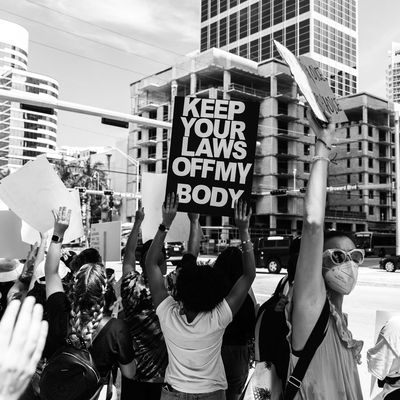
The fate of abortion rights in Florida hinges on whether the State Supreme Court, one of the most conservative in the nation, agrees that a 15-week ban violates the state’s constitution. Based on the justices’ statements in a hearing on Friday, it sounds like they’re open to upholding the law, which would also pave the way for a separate six-week ban to take effect and devastate abortion access for the entire Southeast. A ruling in the case could come at any time.
The abortion providers who sued the state maintain that the right to privacy, which voters added to the Florida constitution in 1980, protects the right to abortion. The court ruled unanimously in 1989 that this was the case, and as recently as 2012, voters rejected a constitutional amendment that would have taken away abortion protections. The justices appeared to doubt the plaintiffs’ argument on Friday, questioning whether voters were thinking about abortion rights 40 years ago when they enshrined the right to privacy.
The court’s skepticism shouldn’t come as a surprise. Five of the seven justices had been appointed by Republican governor Ron DeSantis, and several of them hold deep ties to the anti-abortion movement. Justice Charles Canady did not recuse himself from the abortion case even though his wife, Jennifer Canady, is a state lawmaker who sponsored the six-week ban. Justice Jamie Grosshans did legal work for Alliance Defending Freedom, the group suing to roll back the FDA’s approval of Mifepristone, one of the two pills used in medication abortions.
At one point in the hearing, Chief Justice Carlos Muñiz argued that when the U.S. Supreme Court overturned Roe v. Wade last year, it “eviscerated” the notion that privacy protections extend to abortion rights. He asked lead attorney Whitney White, who represents the abortion providers who sued the state, about Dobbs, adding: “You’re asking us to essentially take a whole class of human beings and put them outside of the protection of the law, essentially in the sense that if the legislature wants to protect those human beings, they are precluded by the Constitution of Florida from doing that.” This appeared to be a reference to fetuses; embryos and fetuses do not hold legal personhood in Florida, although DeSantis has endorsed back-door measures that would accomplish this.
White argued that the 15-week ban has put pregnant people’s lives at risk, since doctors have found themselves unable to provide life-saving care out of fear they’ll be prosecuted. “These injustices have been ongoing for a year, and if this court doesn’t step in now, there is an even more dangerous six-week ban waiting in the wings,” she said.
Upholding the 15-week ban, and thus allowing the 6-week ban to take effect 30 days afterward, would have disastrous effects on abortion access in the region. Florida has experienced one of the largest increases in the number of abortions post-Dobbs, with many patients traveling from Alabama, Georgia, Mississippi, Louisiana, Tennessee, and Texas to get care. Researchers estimate that there was an increase of more than 12,000 clinician-provided abortions in Florida in the nine months following the ruling. In practice, the six-week ban would amount to a total abortion ban: Most people don’t yet know they’re pregnant at six weeks, and Florida’s onerous requirements for patients, including two in-person clinic visits with a 24-hour waiting period in between, are difficult to overcome. And while the law includes exceptions for rape, incest, and certain medical conditions, these are rarely granted in practice.
Of course, it’s possible that the court could decide to strike down the 15-week ban, in which case abortion would become legal in the state once again up until viability, or around 24 weeks of pregnancy. If the court upholds the law, however, there is still a path for Florida voters to enshrine abortion rights explicitly in the state constitution. “This decision belongs with the people, and that’s why we’re fighting to put abortion on the ballot in 2024,” Senate Democratic leader Lauren Book said in a statement. “We’ve seen the dangerous impact of abortion bans here and across the country. We must regain the rights stolen from us.” Advocates have gathered more than 600,000 signatures so far and need to reach 900,000 by February in order to make the ballot. If the State Supreme Court approves the proposal, however, it will require at least 60 percent of votes to pass — and take months to be implemented if it succeeds.
The Cut offers an online tool you can use to search by Zip Code for professional providers, including clinics, hospitals, and independent OB/GYNs, as well as for abortion funds, transportation options, and information for remote resources like receiving the abortion pill by mail. For legal guidance, contact Repro Legal Helpline at 844-868-2812 or the Abortion Defense Network.


